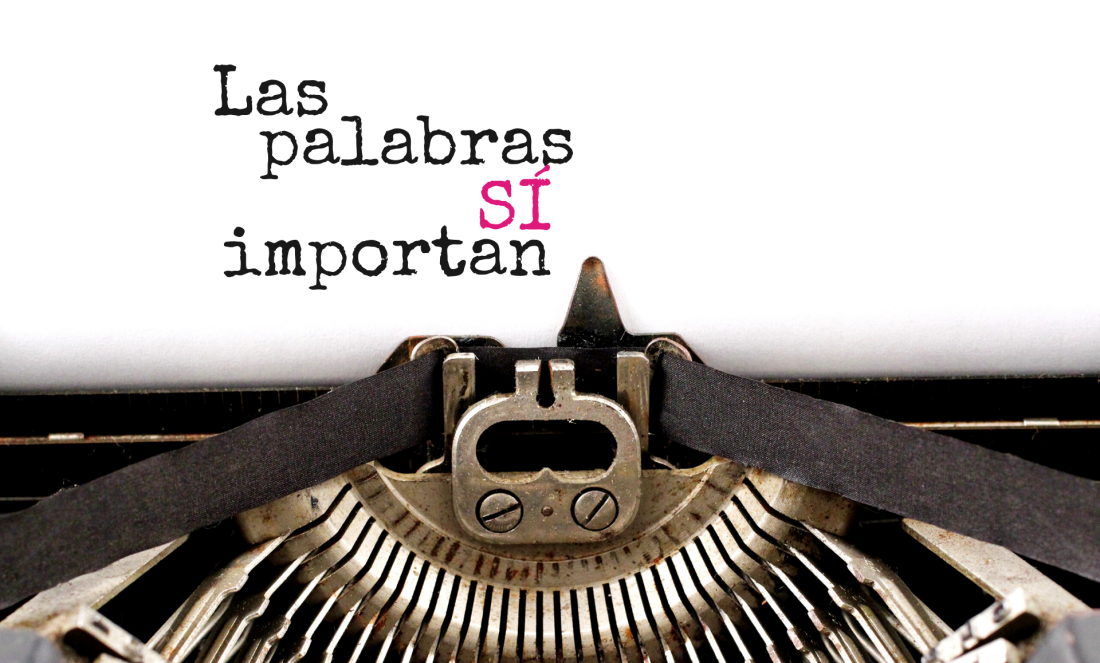
"Our elders": An expression up for debate
The relationship between language and thought, how words construct thought and how our beliefs are consolidated or modified through them, has been the subject of reflection and study for a long time.
Although I have already devoted several posts to this subject on my blog [Words do matter (2017) and Older people, language, good and bad treatmente (2020)], I return to it again. The reason is a small stir generated on twitter after Jordi Évole resorted to the expression "our elders" to congratulate the magnificent programme (Felices 70) on visions in old age broadcast by Salvados on La Sexta TV on 31 January. Different organisations and some professionals warned him about the inappropriateness of this term, without at any time attributing to this renowned journalist an offensive intention towards the elderly.
"Our elders" is a much-used term that is usually used in a friendly and condescending tone to refer to the varied group of the population that has passed a certain age. A term that angers a large part of the associative movement of older people and also different entities related to ageing.
An expression that has been repeated ad nauseam in this pandemic by politicians, the media and also by professionals. In the declaration "Faced with Covid-19's crisis: an opportunity for a better world", signed by 1,134 people from different fields and disciplines, we took a stance on the various shortcomings revealed by this situation and the urgent need to change the current model of long-term care, as well as on the ageism still very present in our society and the convenience of an appropriate use of language in the media and public forums. A recent article by Feliciano Villar, professor at the UB, deals precisely with the representation of the elderly in the media during the Covid-19 pandemic and ageism.
A controversial term that many of us advise against, but which not everyone seems to find inconvenient. In a recent post published on a CENIE (International Centre on Ageing) blog, philosopher Josefa Ros Velasco offered her own account of the development of this incident on the web and also shared some doubts as to whether the mere use of certain terms in relation to old age and older people is not being given too much importance. This encourages me to continue and nurture this debate, which, although not new, is still ongoing.
In addition to the important contributions from the philosophy of language, the research carried out in fields such as neuropsychology, neurolinguistics and social psychology is crucial. In recent decades, several studies have shown the close and complex connection between language and the thought/emotion/behaviour triad. Damásio's studies have revealed the definitive and sometimes overlooked influence of emotions on decision-making. John Bargh's magnificent compilation entitled "Why we do what we do, the power of the unconscious" summarises findings of enormous interest for further research in this field. The publications of Luis Castellanos, a Spanish philosopher specialising in language, point to the effects of words on our behaviour and well-being. Psychological interventions aimed at improving mood and guiding behavioural change use a variety of techniques that use language as a way to identify and revise maladaptive beliefs, meanings and thoughts. Organisational coaching pays special attention to what people say in order to conduct individual coaching and team supervision processes.
The list of fields, disciplines and contributions to this object of study is immense. But in the discussion at hand, I would like to focus on the analysis of the linguist and cognitive scientist George Lakoff. This author states that human thought is organised through what he calls mental frameworks, which serve to organise and interpret our world by interconnecting concepts. These mental frameworks are activated when, in everyday life, we use or hear certain terms. Particularly powerful, according to this expert, are those that act as metaphors.
Let me give a couple of examples of the influence of these mental frameworks when we opt for one expression or another. One of the metaphors that is most deeply rooted in the field of dementia is that of interpreting dementia as a "living death" and those who suffer from it, especially when the deterioration progresses, as a "zombie" who has, in reality, ceased to be a person. Using expressions such as "the wanderers" (to refer to people with cognitive impairment who walk continuously with the risk of getting lost) or "empty trunks" (to refer to those who already have very advanced dementia) activate these mental frameworks. These are not harmless because they are based on the consideration that "they are no longer a person", which can end up leading to inappropriate treatment (ignoring the person in conversation, not giving them the option to express themselves, not seeking the logic of their behaviour, not protecting their privacy, etc., etc.) due to the perception that "what difference does it make what I do or what I say, if in the end... they don't know any better!

Examples that can give an idea of how the use of certain expressions, as opposed to other options, is not a mere choice of style or whim. Words, the language we use, are the main vehicle of our thinking (not the only one), they are linked to emotions and guide behaviour. Our words reflect our regard for others and reflecting on them can help us to re-consider our outlook and guide our treatment. Because as we look, we treat. We cannot lose sight of the fact, as the philosopher Xavier Etxeberria affirms, that good recognition of others is a basic and indispensable condition for good treatment.
For decades, social groups that objectively feel and find themselves at a social disadvantage (women, people with disabilities, people with dementia, ethnic minorities, LGTBI people...) have been defending the importance of a responsible and inclusive use of the language we use when we name people and when we refer to these groups.
Of particular relevance, due to their impact and potential for modelling, the speeches are made in public forums (politicians, experts, public and private sector managers involved in social and health care, etc.), as well as the messages offered by the media, advertisements and films. The cultural movement for change in the way old age and long-term care are viewed, which advocates that social and health services should really put people at the centre, also takes a stand in this defence. As Professor Amparo Suay states in an excellent article entitled "A new look at the treatment of the elderly in the media from the perspective of the ethics of communication", this is a collective responsibility, in which old age and the elderly have received less attention than other social groups.
“Our elders”?
Having said that, let us now turn to the expression that motivates this post, that of "our elders", a controversial term that provokes different reactions and positions. Especially because when it is used, good intentions preside over the communicative purpose of the speaker. This term is usually used to show affection, commitment, support, respect, homage and tribute to a whole generation. Without wishing to underestimate the importance of communicative intent in the meaning of language, I have been defending and maintain that the term "our elders" is not appropriate and should be avoided when referring in general to the elderly and especially in public interventions.
Communicative intention is an important element in judging the meaning of the speaker, but it is not the only one at stake when we refer to the construction of a collective vision of old age and the social perception of older people. I do not consider this term acceptable for several reasons.
Firstly, because it expresses gender and group uniformity. And if we are talking about old age, ageing and older people, nothing could be further from the truth. As we well know, scientific evidence reiterates the enormous heterogeneity that accompanies the process of human ageing.
Secondly, because the use of the possessive denotes ownership, a relational scenario that is substantially distant from that of interdependence, which is in my opinion the appropriate one to understand and address the relationships between people, groups and communities.
Thirdly, because the mayastatic intention (to show respect, admiration, honour, pay tribute...) that this expression may harbour, taking into account the thematic contexts in which the discourse on old age usually takes place (health problems, pensions, social protection, situations derived from fragility or dependence) is subsumed by a paternalistic embrace and by the message that we are dealing with a group that is unprotected, lacking, fragile and, consequently, in need of permanent protection. This does not correspond to reality, nor does it represent the majority of older people, who are capable and competent enough to continue to lead their own lives and make their own decisions, without any need for overprotection, however well-intentioned it may be.
Nor am I convinced by the message that often accompanies this expression, which continually appeals to the moral obligation to repay "our elders" for all they have done for today's society. I do not mean to undermine the value of the concept of reciprocity, which is essential in community relations, but I think it is dangerous to slide into the realm of gratitude for what are their citizenship rights (health, pensions, social services or housing, among others) and to which the elderly, like the rest of society, should have access.
I now propose an exercise: to think about the expression "our elders" by changing the protagonists. If this elocution were applied to other groups, if for example a journalist or a politician were to say "our women" or "our disabled", what reaction would it provoke? would it be the same as when applied to the older population? I doubt it. Probably the response from collectives that have been defending processes of empowerment of these groups and people for decades would not be long in coming. And rightly so, I believe. Let us then ask ourselves why this denomination of older people is not so shocking: perhaps it has to do with deeply rooted beliefs, many of them unconscious, that link older people with uniformity, with lack of competence, with deprivation, with a characterisation that infantilises them and with the need for permanent protection? There is a wide range of specialised literature that shows the existence of these negative stereotypes towards older people, as well as their relationship with social discrimination (ageism) and poor treatment. Of particular interest is the work carried out by the emeritus professor of the UAM, Rocío Fernández-Ballesteros, a nationally and internationally renowned gerontologist.
I never tire of recommending the resounding article by Anna Freixas, “Solo mía”, published in the newspaper El País, in which she alludes to the use of this term. This veteran, expert feminist gerontologist, argues the unwanted paternalism that this expression contains, affirming furthermore that resorting to the strategy of continually sentimentalising old age is nothing more than a form of contempt. I could not agree more.
To conclude, I would also like to refer to the questioning of the legitimacy of those who have not yet reached an advanced age to express considerations, in this case, of how language about old age and the elderly should be. Josefa Ros asks whether this is not yet another example of the paternalism that we are trying to eradicate, by giving opinions and wanting to decide how older people should be named.
There is no doubt that the participation of the people affected must be at the forefront of the design and development of policies, decisions and proposals. But, first of all, we must be aware that the associative movement of older people, both in our country and in others, has already expressed its opinion on this issue. Various organisations, including the Spanish Confederation of Elderly People's Organisations (CEOMA) and the Democratic Union of Pensioners and Retired People of Spain (UDP) strongly reject discriminatory language and specifically the use of the expression "our elders", as can be seen in their public statements and in the guides drawn up for the responsible use of language (some links are provided at the end of this article).
But furthermore, it seems to me a mistake to argue that those who have not reached a certain age (what... 60, 65, 70, 83...?) should remain waiting to pronounce themselves, to pronounce ourselves, on issues that will affect us, unless we die beforehand, in the future. Because this would mean transferring the issue of old age to one population group when it is something that concerns us all. Ageing must be tackled from a life-cycle perspective and from an intergenerational approach, as has been proposed, at least at a declarative level, in the various conventions and international consensus documents that address and seek to guide ageing policies.
I share the warning of the risk of remaining at the superficial level of words. The analysis of language should allow us to grasp the meaning of our expressions, to become aware of the vision or meaning they contain and also of the type of interpersonal relations and power-sharing they support. For example, it is not the same to say "in this centre we let them make their own decisions" as "in this centre people make their own decisions".
The reflexive review of language in care that I address in some of my work in gerontological services seeks to do just this. Language checking in organisations is a powerful and highly recommended practice. In order to move towards person-centred care models, now very fashionable with the risk that this implies, it is a very valuable exercise as it allows us to identify beliefs and attitudes that we should work on. We would achieve little if we simply drew up a list of new "politically correct" expressions after an automatic word substitution exercise.
Words do matter. They matter in all areas of life: in the family, in interpersonal relationships, at work, in business, in art and in love. In the processes of change and learning, language is an indispensable ally. It is not a trivial matter; the way it is used is not innocuous, even if it is applied with no intention to harm or offend. In the context of care, words have a special effect and power because they affect very vulnerable people. In the construction of a necessary cultural change in old age, to which many of us are committed, so too. As George Lakoff says, "thinking differently requires speaking differently".
I hope that these considerations contribute to the necessary debate on a non-discriminatory language in old age, which will undoubtedly be of great value to continue advancing in this unstoppable process of re-constructing a vision of old age according to which people are seen and appreciated from the value and uniqueness that guides each life project. In which we are seen and appreciated from our capacities, with opportunities to continue contributing to the society of which we are a part, from our desire to continue living with meaning and connected to others, even if at times or when necessary, we need the support, care and protection of the communities to which we belong.
Original text published in Teresa Martínez's blog: "La atención centrada en la persona, un camino por recorrer" (Person-centred care, a road to travel), a space that we fervently encourage you to explore.
Some published guidelines and recommendation documents on the use of language in relation to ageing, older people and cultural change in care:
- Mayores y medios de comunicación. Unión Democrática de Pensionistas y Jubilados de España (UDP)
- Buen trato periodístico a las personas mayores. Foro LideA
- Sobre las imágenes sociales del envejecimiento. Recomendaciones. Consejo de Personas Mayores de Asturias.
- Guía de estilo para periodistas de personas mayores. EAPN-Madrid.
- El Alzheimer y otras demencias. El uso del lenguaje en medios de comunicación. CEAFA.
- The language of cultural change. The Pioneer Network.


Add new comment